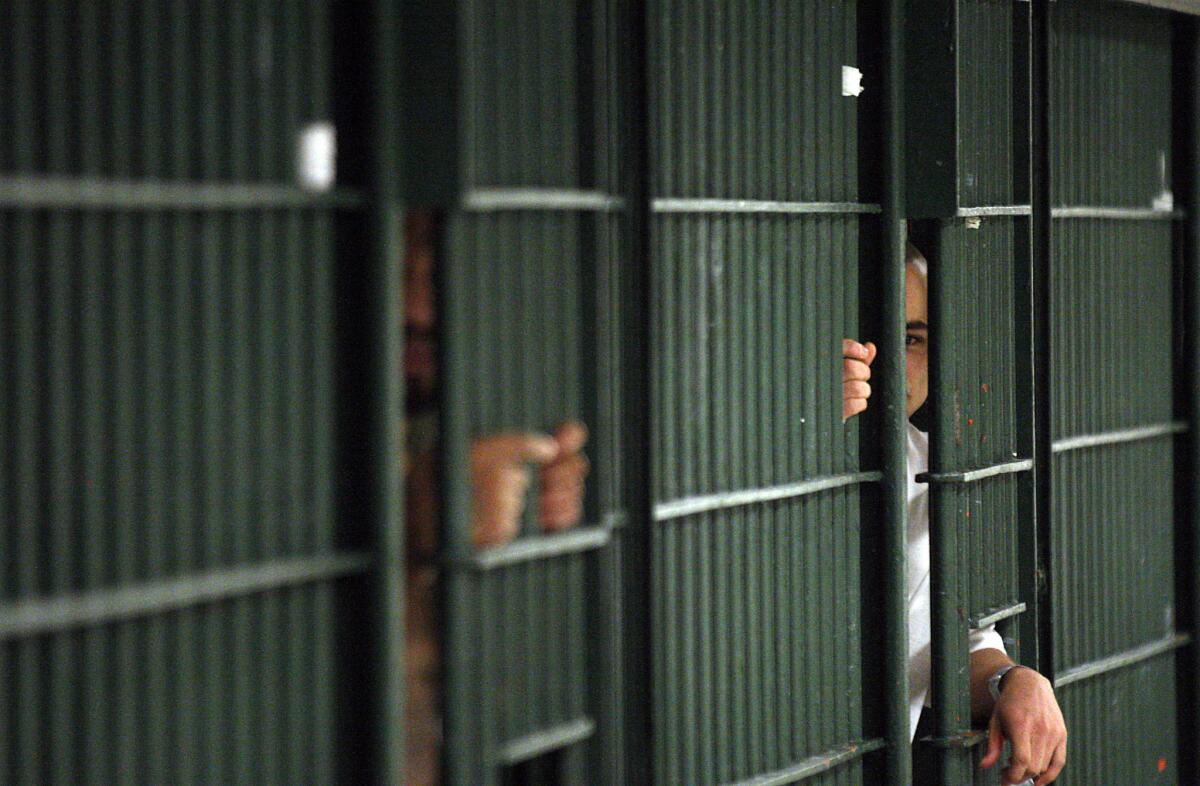L.A. County jails probe ignited by inmate’s letter, FBI agent says

- Share via
The wide-reaching federal investigation into abuse and corruption in L.A. County jails that has thus far ensnared 20 deputies in the largest mass arrests of sheriff’s officials in decades arose out of a letter from a jail inmate detailing instances of violence by deputies, the lead case agent testified Wednesday.
FBI Agent Leah Marx took the stand in the trial of Deputy James Sexton, one of seven sheriff’s officials charged with conspiracy and obstruction of justice for allegedly scheming to keep an informant hidden from federal agents in an attempt to impede the investigation into the jails. It was Marx who arranged for a cellphone to be smuggled into the informant by bribing a corrupt deputy, so that the informant could report back to the FBI on excessive force and other abuses in the jails.
Marx said the investigation began in June 2010, more than a year before the cellphone sting. She testified that a letter from an inmate in county jail detailing incidents of deputies using excessive force was passed along to her. What began with an inquiry into the individual incidents eventually grew into a sweeping joint civil rights and public corruption investigation, Marx said.
Marx recounted on the witness stand that two or three months into the investigation, she was told by an inmate she should contact Anthony Brown, an inmate at Men’s Central Jail, because he had information about violence by deputies. After interviewing him numerous times, she signed him up as an informant for the FBI, Marx said.
Sometime in 2011, Brown told her that certain deputies were approaching inmates and offering to smuggle in contraband for a bribe. The FBI decided to get a cellphone to Brown for the dual purpose of setting up the corrupt deputy — Gilbert Michel — to take the bribe, and to enable Brown to report jail beatings in real time, possibly even to take photos as evidence, she said.
She countered arguments by Sexton’s attorney that the FBI had engaged in a “poorly planned and extremely dangerous” operation by giving the phone to a violent inmate serving more than 400 years with 15 felonies on his record, something that the defense attorney said could allow Brown and other inmates to plan an escape or arrange a hit on a witness.
Marx said that calls and text messages were closely monitored in real time, and that the phone service could be terminated by agents. Brown made only two calls that weren’t to his FBI handler, an undercover agent — and it was calls from a cellmate, who had seen Brown receive the phone and wanted to call his girlfriend, Marx said.
Soon after Brown received the phone, it was discovered by deputies during a routine search, wrapped in a glove and hidden in a potato chip bag. A few days later, Marx discovered on the sheriff’s online database that Brown was marked as having been released to another agency. Unbeknown to her, he was being moved around by Sexton and others within the jail system under a different fake name, making it impossible for agents to find him.
In the meantime, sheriff’s internal investigators, several of whom stand accused alongside Sexton of obstruction, were questioning Brown themselves, having discovered that the inmate had called Marx’s desk line at the civil rights squad of the FBI’s L.A. field office.
“What’s the deal with the feds?” one asked Brown in an interview that was played for jurors Wednesday. “This is my house.... If you have a dirty backyard or a dirty house, do you want to clean it yourself or have someone do it for you?” said the deputy, whose identity wasn’t immediately clear from the recording.
Brown was initially reluctant to give investigators details about what he knew about the length and scope of the federal investigation.
“You want me to talk, I need a couple things,” he said. “You get me a cheeseburger, cigarettes and a soda and we can talk.”
Two weeks after the phone was discovered, Marx and another agent went to the jail to speak to Brown in person. About an hour later, a sergeant stormed into the room and said “This interview is over,” grabbed Brown and handed him to deputies behind him, Marx recalled.
“I told him it was going to be OK, and that we’ll get him out of there,” she said.
In the following days, directives went out within the Sheriff’s Department saying that no outside law enforcement agencies should be allowed to interview inmates without the permission of top executives, Marx testified.
Marx said that as the investigation continued, Sexton contacted her initially saying he wanted to talk to only her and off the record. After she refused, he eventually began cooperating and detailing how Brown was concealed within the jail system.
Sexton explained that because the system sends an alert if an inmate isn’t fingerprinted or entered into a background check system within 48 hours of booking, they had to continue booking him under a new name, Marx said. Sexton said Brown’s inmate file, known as a “records jacket,” was removed from the jail and kept in car trunks and safes, she testified.
Sexton’s attorney told jurors in opening statements that his client was only following orders from his superiors. He said Sexton was helping to hide Brown to protect him from corrupt deputies that he was informing on.
Marx is expected to resume her testimony Thursday.
More to Read
Sign up for Essential California
The most important California stories and recommendations in your inbox every morning.
You may occasionally receive promotional content from the Los Angeles Times.











